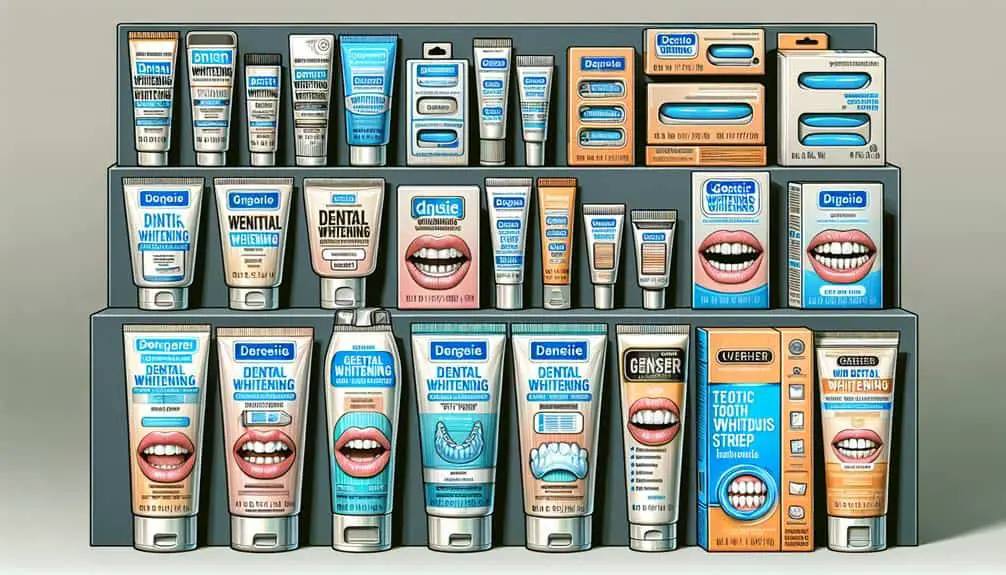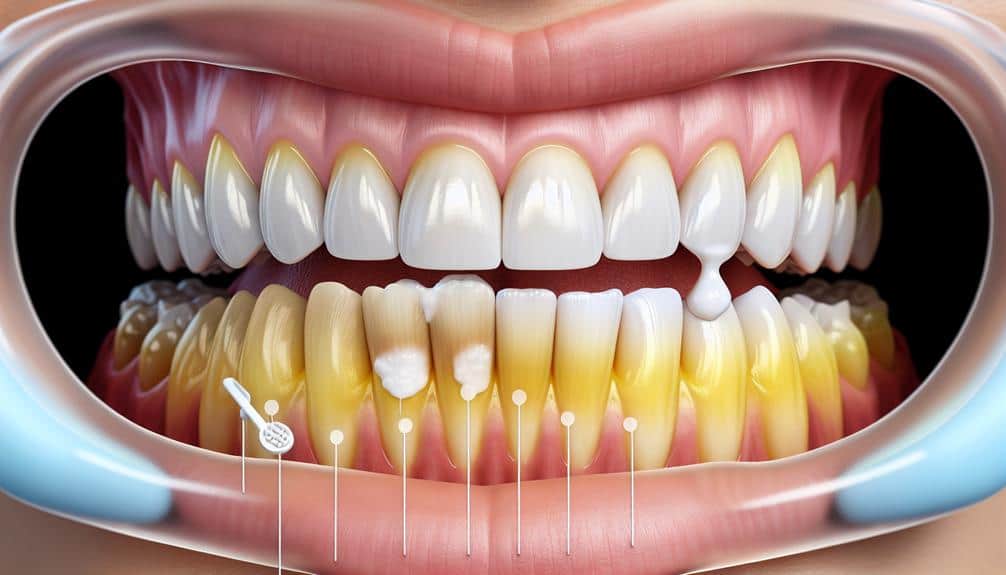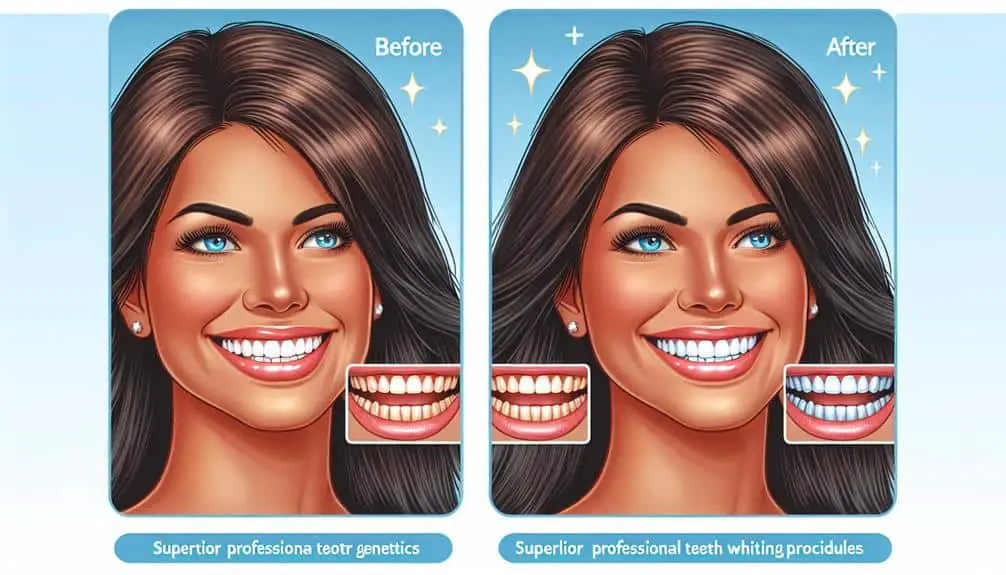When dealing with genetic tooth discoloration, opt for the best whitening products like Sensodyne Pronamel Gentle Whitening Toothpaste for sensitivity, Colgate Optic White Express White Toothpaste for effective brightening, and Crest 3D White Brilliance Toothpaste for strengthening enamel. Select toothpaste that suits your needs to enhance brightness and combat genetic factors affecting your teeth. These options offer targeted solutions for a brighter smile and better oral health. Additional professional whitening treatments and home remedies can provide tailored solutions. Choose wisely to tackle genetic discoloration effectively and boost your confidence with a radiant smile.
Key Points
- Sensodyne Pronamel Gentle Whitening Toothpaste is ideal for sensitive teeth.
- Colgate Optic White Express White Toothpaste offers effective whitening.
- Crest 3D White Brilliance Toothpaste strengthens enamel while whitening.
- Choose toothpaste based on sensitivity and enamel protection needs.
- Whitening toothpaste can enhance brightness for genetic discoloration.
Overview of Genetic Tooth Discoloration
When dealing with genetic tooth discoloration, understanding the underlying causes is essential to determine the most effective treatment approach. Causes of genetic tooth discoloration can be traced back to inherited factors that affect the enamel or dentin of the teeth. These genetic factors can lead to variations in tooth color, making some individuals more prone to discoloration than others.
Prevention of genetic tooth discoloration involves maintaining good oral hygiene practices, such as regular brushing and flossing, to prevent staining agents from settling on the teeth. Additionally, avoiding tobacco products and limiting consumption of foods and drinks that are known to cause staining can help in preventing genetic tooth discoloration. It's important to note that while genetic tooth discoloration may not be entirely preventable, these preventive measures can help minimize its occurrence and severity.
Understanding the causes and implementing preventive strategies are vital steps in managing genetic tooth discoloration effectively.
Factors Contributing to Genetic Discoloration
To comprehend genetic tooth discoloration fully, it's important to explore the various factors that contribute to this condition. Genetic predisposition plays a significant role in determining the color of your teeth. Some individuals may inherit genes that make them more prone to certain types of tooth discoloration, such as yellow or brown hues that are difficult to whiten with regular oral hygiene practices. Understanding your genetic predisposition can help you tailor your whitening approach more effectively.
Environmental influences also play a pivotal role in genetic tooth discoloration. Factors such as diet, smoking, and exposure to certain medications during tooth development can impact the color of your teeth. For example, excessive consumption of coffee, tea, or red wine can lead to staining over time, exacerbating genetic discoloration. Similarly, smoking can contribute to yellowing of the teeth, making it harder to achieve a brighter smile.
Best Whitening Toothpaste for Genetics
For individuals with genetic tooth discoloration, selecting the right whitening toothpaste can make a significant difference in enhancing the brightness of their smile. When choosing a whitening toothpaste tailored to genetic discoloration, it's important to take into account factors such as tooth sensitivity and enamel protection.
Here are some top options to help you achieve a whiter smile:
- Sensodyne Pronamel Gentle Whitening Toothpaste: Specifically designed for sensitive teeth, this toothpaste not only helps whiten teeth but also protects enamel, making it an excellent choice for those with genetic discoloration and sensitivity.
- Colgate Optic White Express White Toothpaste: This toothpaste is known for its effective whitening properties while also providing enamel protection, making it suitable for individuals looking to brighten their smile without compromising enamel health.
- Crest 3D White Brilliance Toothpaste: Crest's advanced formula not only whitens teeth effectively but also helps strengthen enamel, offering a balance between brightening and protecting your teeth.
Professional Whitening Treatments for Genetics
Professional whitening treatments tailored to genetic tooth discoloration offer advanced solutions for enhancing the brightness of your smile effectively and safely. In the field of cosmetic dentistry, professional whitening treatments such as in-office bleaching procedures or take-home kits prescribed by your dentist are designed to target genetic discoloration specifically. These treatments often contain higher concentrations of whitening agents compared to over-the-counter products, ensuring more significant results.
Enamel restoration is another key aspect of professional whitening treatments for genetic tooth discoloration. Through advanced techniques like microabrasion or resin infiltration, cosmetic dentists can improve the appearance of discolored enamel, addressing genetic factors that contribute to tooth staining. Enamel restoration procedures aim to not only whiten the teeth but also strengthen and protect the enamel for long-lasting results.
When seeking professional whitening treatments for genetic tooth discoloration, consult with a qualified cosmetic dentist to determine the most suitable approach for your specific needs. Their expertise and tailored solutions can help you achieve a brighter, more confident smile that reflects your genetic predispositions accurately.
Home Remedies for Genetic Tooth Discoloration
Enhance your smile's brightness at home with simple yet effective remedies tailored for genetic tooth discoloration. When dealing with genetic tooth discoloration, natural remedies and DIY treatments can be gentle yet potent solutions to help whiten your teeth.
- Oil Pulling: Swishing coconut oil or sesame oil in your mouth for about 15-20 minutes daily can help reduce bacteria and plaque buildup, which may contribute to discoloration.
- Baking Soda Paste: Create a paste using baking soda and a small amount of water. Gently brush your teeth with this paste a few times a week to help remove surface stains caused by genetic factors.
- Strawberries and Baking Soda Mask: Mash strawberries with a pinch of baking soda to create a natural whitening mask. Apply this mixture to your teeth for about five minutes before rinsing thoroughly. The malic acid in strawberries can help break down stains while the baking soda aids in scrubbing them away.
Frequently Asked Questions
Are There Any Specific Dietary Changes That Can Help Prevent or Reduce Genetic Tooth Discoloration?
To prevent or reduce genetic tooth discoloration, consider dietary changes. Incorporate foods rich in antioxidants like fruits and vegetables. Limit intake of staining substances such as coffee or red wine. Lifestyle choices like regular dental cleanings can also help maintain a bright smile.
Can Genetic Tooth Discoloration Be Passed Down Through Generations in Families?
Genetic tooth discoloration can be passed down through generations in families. Understanding your family history can help with prevention and early treatment. Consulting with a dental professional is essential for managing genetic inheritance of tooth discoloration.
Are There Any Long-Term Side Effects of Using Whitening Products for Genetic Tooth Discoloration?
Using whitening products for genetic tooth discoloration may pose potential risks. Long-term effects could include tooth sensitivity or enamel damage. Consult with a dentist for personalized advice on managing genetic discoloration safely and effectively.
Is There a Specific Age at Which It Is Most Effective to Start Whitening Treatments for Genetic Tooth Discoloration?
Starting whitening treatments for genetic tooth discoloration at an early age can be most effective. Early intervention can enhance the effectiveness of the treatment. Consider beginning when suggested by your dentist for best results.
Can Genetic Tooth Discoloration Be Completely Reversed With Whitening Products, or Are There Limitations to the Results That Can Be Achieved?
To achieve the best results with genetic tooth discoloration, whitening products can be effective, but complete reversal may have limitations. Consistent use of treatment options and proper maintenance can enhance effectiveness, despite challenges like potential reoccurrence.



